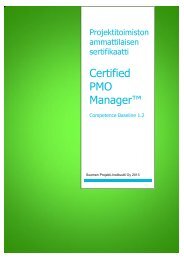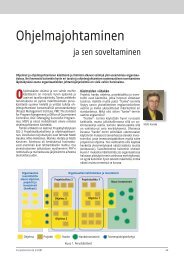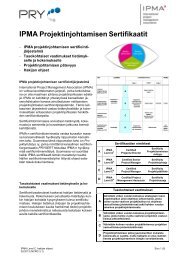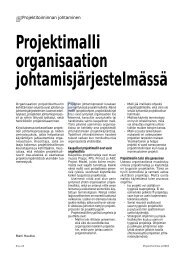Boundary activities and readiness for ... - Projekti-Instituutti
Boundary activities and readiness for ... - Projekti-Instituutti
Boundary activities and readiness for ... - Projekti-Instituutti
Create successful ePaper yourself
Turn your PDF publications into a flip-book with our unique Google optimized e-Paper software.
Introduction<br />
<strong>activities</strong> contribute to the success of the change program by building<br />
<strong>readiness</strong> <strong>for</strong> change program implementation. In this dissertation, a<br />
qualitative methodology is employed to explore the initiation dynamics of<br />
change programs. The empirical study is based on qualitative data from<br />
three significant change programs. As described, the study is in<strong>for</strong>med by<br />
research on organizational boundaries <strong>and</strong> organizational change, adopting<br />
the concepts of boundary <strong>activities</strong> <strong>and</strong> <strong>readiness</strong> <strong>for</strong> change from prior<br />
studies. The aim is to refine <strong>and</strong> extend the existing theoretical<br />
underst<strong>and</strong>ing by applying these concepts in the context of large, multiproject<br />
change programs. In doing this, the study follows the abductive<br />
multiple case study logic (Dubois & Gadde, 2002) that allows the<br />
development of the research frame in the interaction between existing<br />
theories <strong>and</strong> empirical observations.<br />
The original motivation <strong>for</strong> the study arose from an attempt to underst<strong>and</strong><br />
what actually happens during the early phase of large-scale change<br />
programs. The research question guiding the study is: How are the<br />
boundary <strong>activities</strong> concerning the boundary between the program <strong>and</strong><br />
the parent organization associated with the success of change program<br />
initiation? This main research question is further elaborated <strong>and</strong> more<br />
detailed questions are presented after the literature review in section 2.5.2,<br />
where the initial research framework is introduced.<br />
This doctoral research has been a part of a larger research project on<br />
program management, STRAP–PPO (Strategic linking of programs <strong>for</strong><br />
public <strong>and</strong> private organizations) at BIT Research Centre of Helsinki<br />
University of Technology (now Aalto University, School of Science) in<br />
2004–2008. The project brought together academic researchers <strong>and</strong><br />
representatives of several private <strong>and</strong> public sector organizations that were<br />
interested in the increasingly prominent topic within the project<br />
management discipline, program management. The aim of the STRAP–<br />
PPO project was to discover <strong>and</strong> develop effective management practices<br />
<strong>for</strong> programs in different organizational environments <strong>and</strong> in different<br />
situations <strong>and</strong> contexts. The goals of the research project directed the<br />
doctoral research to focus on program management. The author of the<br />
study decided to focus the study on program initiation based on discussions<br />
with other involved researchers <strong>and</strong> early observations on program<br />
management practice. In the early days of the STRAP–PPO project, in<br />
several seminars with the participating organizations <strong>and</strong> in the initial field<br />
interviews with program management practitioners, program initiation<br />
repeatedly came up as a particularly challenging stage. The early phases of<br />
large-scale change programs were viewed to require distinctively different<br />
measures than initiating smaller projects, <strong>and</strong> program management<br />
6









